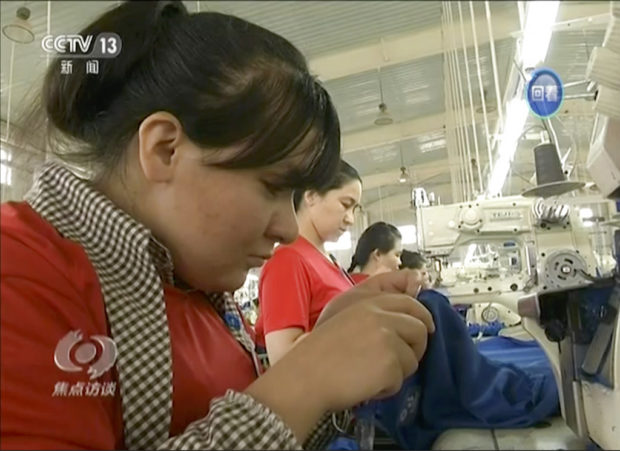Minorities held in China sew clothes that can end up in US

In this file image from undated video footage run by China’s CCTV via AP Video, Muslim trainees work in a garment factory in the Hotan Vocational Education and Training Center in Hotan, Xinjiang, northwest China. AP
HOTAN, China — Barbed wire and hundreds of cameras ring a massive compound of more than 30 dormitories, schools, warehouses and workshops in China’s far west. Dozens of armed officers and a growling Doberman stand guard outside.
Behind locked gates, men and women are sewing sportswear that can end up on US college campuses and sports teams.
This is one of a growing number of internment camps in the Xinjiang region, where by some estimates 1 million Muslims are detained, forced to give up their language and their religion and subject to political indoctrination. Now, the Chinese government is also forcing some detainees to work in manufacturing and food industries. Some of them are within the internment camps; others are privately owned, state-subsidized factories where detainees are sent once they are released.
The Associated Press has tracked recent, ongoing shipments from one such factory inside an internment camp to Badger Sportswear, a leading supplier in Statesville, North Carolina. The shipments show how difficult it is to stop products made with forced labor from getting into the global supply chain, even though such imports are illegal in the US Badger CEO John Anton said Sunday that the company would source sportswear elsewhere while it investigates.
Chinese authorities say the camps, which they call training centers, offer free vocational training for Uighurs, Kazakhs and others, mostly Muslims, as part of a plan to bring minorities into “a modern civilized” world and eliminate poverty in Xinjiang. They say that people in the centers have signed agreements to receive vocational training.
Article continues after this advertisementThe Xinjiang Propaganda Department did not respond to a faxed request for comment. A Chinese Foreign Ministry spokeswoman accused the foreign media Monday of making “many untrue reports” about the training centers, but did not specify when asked for details.
Article continues after this advertisement“Those reports are completely based on hearsay evidence or made out of thin air,” the spokeswoman, Hua Chunying, said at a daily briefing.
However, a dozen people who either had been in a camp or had friends or family in one told the AP that detainees they knew were given no choice but to work at the factories. Most of the Uighurs and Kazakhs, who were interviewed in exile, also said that even people with professional jobs were retrained to do menial work.
Payment varied according to the factory. Some got paid nothing, while others earned up to several hundred dollars a month, they said — barely above minimum wage for the poorer parts of Xinjiang. A person with firsthand knowledge of the situation in one county estimated that more than 10,000 detainees — or 10 to 20 percent of the internment population there — are working in factories, with some earning just a tenth of what they used to earn before. The person declined to be named out of fear of retribution.
A former reporter for Xinjiang TV in exile said that during his monthlong detention last year, young people in his camp were taken away in the mornings to work without compensation in carpentry and a cement factory.
“The camp didn’t pay any money, not a single cent,” he said, asking to be identified only by his first name, Elyar, because he has relatives still in Xinjiang. “Even for necessities, such as things to shower with or sleep at night, they would call our families outside to get them to pay for it.”
Rushan Abbas, a Uighur in Washington, D.C., said her sister is among those detained. The sister, Dr. Gulshan Abbas, was taken to what the government calls a vocational center, although she has no specific information on whether her sister is being forced to work.
“American companies importing from those places should know those products are made by people being treated like slaves,” she said. “What are they going to do, train a doctor to be a seamstress?” /ee